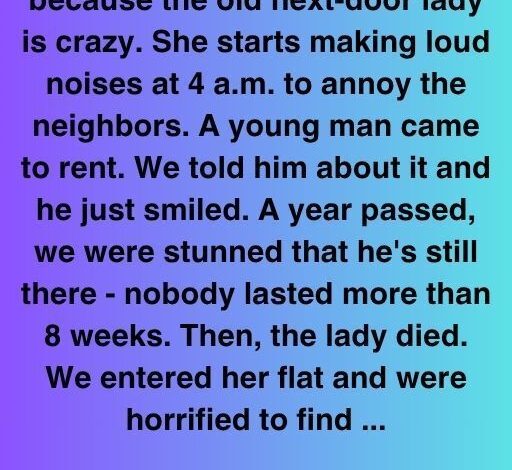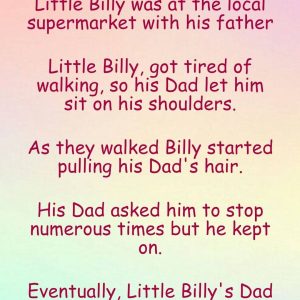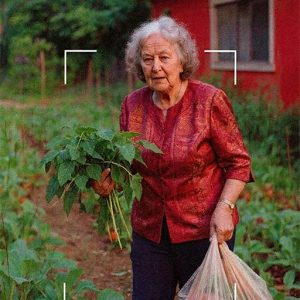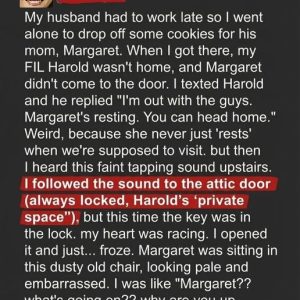
We kept the flat priced low—for good reason. For years, tenants never lasted more than eight weeks, driven out not by the plumbing or the view, but by the woman next door.
At 4 a.m., like clockwork, Mrs. Dragu would begin her ritual: the scrape of her cane down the corridor, the slam of cabinet doors, the stomp of feet like a private parade. And then that laugh—high, breathless, as if she’d told a joke only ghosts could appreciate. She wasn’t just difficult. She was a legend of discontent.
So when Marcus arrived—a quiet young man looking to rent—and we gave him the usual warning, he simply nodded, smiled, and moved in. We expected the same story: silence, then flight.
But he stayed. A year passed. She passed.
After the police finished their sweep, the task of clearing her flat fell to us. She’d left behind no family, no heirs—only silence. The room was eerie, but not chaotic. Notes scrawled on walls. Dates circled, tallies marked. A kettle still warm.
And the letters.
They were everywhere—hidden in coat pockets, behind drawers, under floorboards. Hundreds, all addressed to “Jonas.” Pages filled with apologies, half-poems, birds doodled in corners. One read:
“Jonas, I heard the violin again today. You said you’d return when I did. I painted the hallway yellow. I baked the nut cake. You didn’t come. I’m tired. Maybe next spring?”
We had no clue who Jonas was. No photos. No records. Just ink and longing.
We showed Marcus the letters, expecting indifference. Instead, he asked to read. Sat cross-legged on the floor, quietly turning page after page. Then he said, softly:
“She told me about Jonas. He played violin. Had a birthmark on his left cheek.”
We pulled another letter. And there it was:
“You hated the hat, Jonas. Said it itched. That summer, the sun made your birthmark red—like a strawberry.”
“How do you know that?” we asked.
“She told me,” he said again.
Mrs. Dragu had barely spoken to anyone in the building for years. Yet here was Marcus—her confidant, her witness.
Over the next week, Marcus helped us sort through her things. He brought down a dusty box labeled “records.” Inside, old vinyls. One had “Jonas plays Track 3” scribbled in faded ink. We listened. The melody on Track 3 was fragile, aching—a violin singing from somewhere deep within memory.
Then Marcus came to us with a cloth bundle. Inside was a battered violin. A note tucked inside the case read:
“Find your own voice.”
He took it upstairs.
And the next morning—4 a.m.—the corridor filled with sound. Not stomps or slams, but music. Soft, deliberate notes from that old violin, painting silence with melancholy.
We knocked. He opened the door.
“Thought I’d try,” he said.
“You play?” we asked.
“She told me I should,” he replied, gesturing to a photo on his shelf: a young Mrs. Dragu beside a boy with a violin. The birthmark unmistakable.
“She gave me that before she passed,” Marcus said. “Told me to understand love before it disappears.”
She had known. She wasn’t just making noise—she was composing grief, echoing loss, rehearsing love that hadn’t returned.
Soon after, Marcus announced he was leaving.
“Why now?” we asked.
He smiled. “I found what I came for.”
He left with a backpack and a violin.
Months passed. The flat was rented again. Twice. Each time, the tenants left quickly.
“Too quiet,” they said. “Feels heavy.”
Then a letter arrived, no return address. Inside was a newspaper clipping from a distant town. Headline:
“Young Man Revives Town Square With Morning Violin Performances Honoring Local Legend.”
There was Marcus, beneath a fountain blooming with flowers. In the interview, he spoke of an old woman who gave him a violin and told him to find his voice. He played every morning at 4 a.m.—not to disturb, but to greet the day with intention.
“She wasn’t crazy,” he said. “She was waiting to be heard.”
We returned to her flat, not to clean or pack, but to sit. In a drawer we’d missed before, a final note:
“Dear kind stranger,
If you’re reading this, you’ve outlasted me. Good.
I hope you listened—not just with ears, but with heart.
Jonas always said silence is crueler than any scream.
Make music. Even when it hurts.
—L.”
We framed the note.
And every year, at 4 a.m. on the day she passed, we play Track 3. Loud. Not to honor disturbance, but to celebrate what lived beneath it: the voice waiting to be heard.
Sometimes, those we label “difficult” are just bearing heartbreak no one’s asked to unpack. And sometimes, the quiet tenant is the only one who listens long enough to help them speak again.





